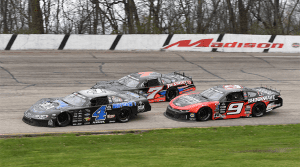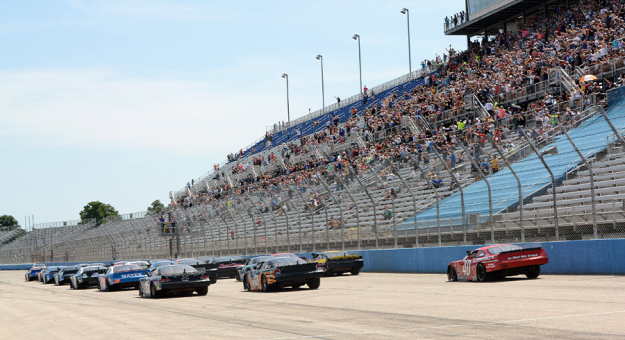MACON, Ill. — Asphalt super late model racing moved a step closer to having a unified national governing body on Tuesday afternoon.
Track Enterprises owner Bob Sargent and ARCA Midwest Tour owner Gregg McKarns announced in a joint release that Track Enterprises will acquire the regional touring series at the end of this season.

Track Enterprises acquired the Champion Racing Ass’n, ARCA/CRA Super Series, JEGS/CRA All-Star Tour and two additional regional grassroots racing series from R.J. Scott and Glenn Luckett in January.
Gregg and Angie McKarns will continue to operate the Midwest Tour through the remainder of this season.
In a video distributed to media by Track Enterprises and the Midwest Tour earlier in the day, Sargent and McKarns both said the move plays well for the future of super late model racing.
“The Track Enterprises team has the resources to take asphalt super late model racing to the next level,” McKarns said. “That said, we are still going to promote six, seven, maybe eight super late model races throughout the region and still be involved at that level. It’s a new day and a new step in that aspect of the sport. We look forward to seeing what happens.
“They (Track Enterprises) acquired CRA and CRA and I had been talking for quite some time,” McKarns added. “It is tough to get on the same page when you have different viewpoints and different business models. Bringing it all under one roof is going to allow for the transformation of asphalt super late model racing into what the drivers and teams want. There are so many different rules packages. It’s tough for a kid like Austin Nason if he wants to race at Berlin on a Wednesday night and then he wants to come and race on our side of the lake, he has to make changes or he has to run a different car.
“If you look at dirt late models or 410 sprint cars and they have that ruling fist that keeps everything on the same page and allows a driver to take his car and run from sea to shining sea,” McKarns continued. “That’s something we’ve stride for in super late model racing that we hope will be good for the teams and good for the fans.”
Sargent addressed the idea of a national touring series for asphalt super late models.
“This purchase is another step toward that goal,” Sargent acknowledged. “We have been vocal. We have had a lot of inquiries from teams, sponsors and promoters about a national series. We really want to proceed with ideas that have been presented to us and our own thoughts. Obviously, history is a big thing with what Gregg’s father (John McKarns) did with ARTGO, and the ASA tours and all of the things the France family has done. There is a lot of history for us to build off of, whether it be Bob Harmon and the All Pro series, we want to build off the history of all that has happened over the years.
“It’s a new era and we bring new ideas and courage to make our end-result product the best that it can be for our fans.”
Sargent, who runs more than 80 races annually under the Track Enterprises banner, said the acquisition and a move toward unification in super late model racing has a lot to do with timing.
“We were at the right place at the right time to build some great some relationships, whether it is with Gregg and Angie, Ron Drager and the ARCA folks, Tim Bryant (Southern Super Series), the France family, with Glenn (Luckett) and R.J. (Scott) and all of the sponsors that come with that,” Sargent said. “Now we are set up to bring together all of the teams across the United States and all the manufacturers and try to build the best product that we can for our fans.”
Sargent said putting all segments of the super late model world under one umbrella will help secure the future of that segment of the sport.
“The part that intrigued me the most is that nothing is broken,” said Sargent, who started promoting races in 1985. “These are very successful entities on their own. A lot of history and a lot of success. Everything is going well, but time always moves, but if we can tweak it and add some positive things, it is better for all the parties involved.
“It gives us some commonality,” he continued. “If we put this all together and we give a good product for the promoter and they embrace us for bringing this show to their tracks, we can pick the finest facilities and give the teams some cost-effective rules packages that we are working with using some different committees, we can package this together and have a great product for the fans at the tracks and on television.”
McKarns endorsed Sargent for knowing what is right for short-track racing.
“At the end of the day, Bob Sargent is a short-track guy,” McKarns said. “I have known him since 2000 if not before. I have the utmost confidence in what his team can do. They are short-track people. A lot of the upper forms of motorsports may not have short-track people making decisions, but we know they do there.”
